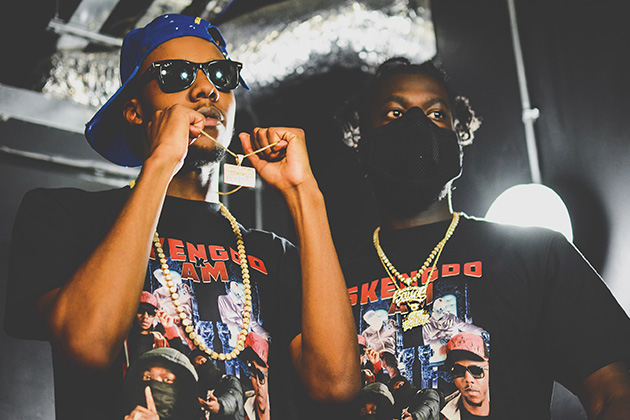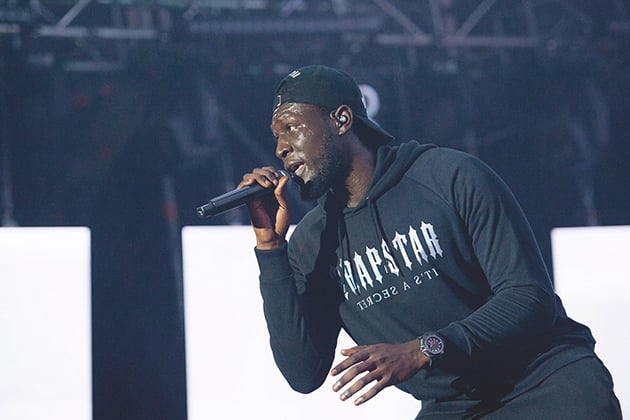In January 2019, for the first time in British legal history, two musicians were arrested and sentenced for performing their own song. Drill rappers Skengdo x AM both received nine-month suspended sentences for playing their track, Attempted 1.0, at a concert in London in 2018. The Metropolitan Police claimed that the performance was in breach of a preexisting injunction and that it “incited and encouraged violence against rival gang members”.
Drill is a form of rap music that originated in Chicago at the start of the decade. Characterised by stark beats, foreboding music and dark, nihilistic lyrics, it has grown in popularity in the UK – particularly in London – in recent years. Its rise has been tarnished by accusations that drill’s lyrics and videos glamourise or incite violence; but can a genre be criminal by its nature?
 Drill rappers Skengdo x AM (Terrell Doyley and Joshua Malinga). © @Sibby2597
Drill rappers Skengdo x AM (Terrell Doyley and Joshua Malinga). © @Sibby2597
A moral panic over Drill music
The Musicians’ Union (MU) submitted a motion entitled ‘Drill Music & Knife Crime’ to the 2019 TUC Black Workers’ Conference. It stated: “Music has often been the focus of moral panic to distract from deeper issues in society. Youth violence has long been an issue before drill music. The majority of drill provides an insight into the needs of young people and does not incite incidents of violence.”
Moving the motion, delegate Linton Stephens said:
Music and artistic self-expression are a reflection, and not a cause, of the individual socioeconomic experience. The government’s diversion tactic to continually blame music of black origin as a contribution to the cause of the rise in outcrops of violent or antisocial behaviour demonises the young black community and suppresses their voice.
Clearly, rises in gang membership and knife crime cannot be blamed solely on what music the proponents may listen to or create. As MU Official John Shortell noted: “Youth violence is a complex issue, and there is no single solution, but criminalising young people making music about the reality of their lives is not one of them.”
Drill music does not lead to gang membership
A joint letter to The Guardian from 65 human rights organisations, musicians and academics expressed deep concern at the types of repressive injunctions being used against musicians: “Incitement to violence is rightly an existing offence, but these injunctions go much further than this.” They also cautioned against censoring artistic expression: “We condemn this suppression: silencing one of the few avenues, through threat of criminalisation, by which young people can discuss the reality of their lives with any hope of being heard.”
Because of the localised nature of the lyrics, rival gangs, specific individuals and real-life events are often referenced. More than 100 drill videos have been removed from YouTube at the request of the Met, which claimed that they invoked or incited violence. This included Attempted 1.0, which it concluded referenced real-life gang-related violence, although you can still listen to the track. “The video censorship doesn’t make sense,” Skengdo told The Guardian. “As soon as it goes down, fans will put it back up.”
In an interview with BBC 1Xtra, Skengdo x AM discussed their take on how they had been interpreted. “We don’t always talk about violence, we talk about solutions, we talk about economic problems, we talk about the repercussions of violence,” claimed AM. Gospel drill fuses the genre with Christian messages in a bid to reach out to troubled youths and lead people away from potential gang involvement. A BBC3 documentary screened earlier this year, 'Escaping Gangs: Death, Jail Or Redemption', detailed the emergence of gospel drill in London and the work of the SPAC Nation church, which delivers high-energy performances to its congregation between sermons and testimonials from former gang members.
Gospel Drill offers hope against hate
A-Y is the leader of Hope Dealers, a group at the forefront of the gospel drill scene. He said their initial intention was to communicate what was going on in their lives to people who came from similar backgrounds. “I started selling drugs at 13, and with that comes violence,” he said. “And then came gang violence, which is essentially family feuds.” When he was 17 he was involved in a serious case: “One of my friends was sentenced to 14 years in prison. Someone invited me to church, and that was when it all changed.”
We are not hitting the root issue. When somebody gets on the mic and creates a track, whatever they are saying has already happened, so we have already missed the root cause.
He agrees that drill music has been discriminated against by the police and the media: “And some would say rightly so, but we are not hitting the root issue. When somebody gets on the mic and creates a track, whatever they are saying has already happened, so we have already missed the root cause.”
A-Y echoes the belief that criminality expressed in music must be looked at in a wider context: “Music is a reflection of people’s lives. Hope Dealers do drill music, but it’s going to be a reflection of what we are currently going through.” Does he think the group has been successful in guiding people away from criminal behaviour? “100%,” he says. “A lot of our work is grassroots mentoring. One of the Hope Dealers is employing more than 30 young people. Most are actively one-to-one mentoring at least 10 young people: men who have been in and out of prison, and haven’t reoffended in the last two years.”
The fallout from Form 696, the Met’s controversial risk assessment for putting on live gigs – that “predominantly feature DJs or MCs performing to a recorded backing track” – which was scrapped in London in 2017 following extensive lobbying from the MU, continues to resonate.
The recent Digital, Culture, Media and Sport Committee’s Live Music Report covered several issues affecting the live music industry, including “concerns about discrimination hindering the success of urban music”. UK Music CEO Michael Dugher approves of the report’s findings: “We must root out discrimination wherever we find it and we support the Committee’s call for cross-departmental action by government to develop guidance for all the relevant authorities to ensure that urban music acts do not face discrimination.”
Black musicians are being discriminated against
The hip-hop and grime rapper ShaoDow, who addressed a Parliamentary committee about the prejudices grime artists face, says he has had issues booking his own shows: “One of the clubs cancelled on the day when they realised what sort of music I make. They said they’d be closed down and were ‘not allowed to play that sort of music here’.”
He blames a complex mixture of issues for this sort of attitude, including “fear, ignorance and an unwillingness to understand that an entire genre of music is not the cause of violence”. He also thinks that grime and drill have been unfairly persecuted by the media and authorities, in a similar way to hip-hop, reggae and dancehall in the past. “It’s curious that the sorts of people who listen to and frequent the venues to enjoy these kinds of music tend to have a similar ethnic background and often already have a difficult relationship with the police and the media,” he says.
And it is not an issue specific to the UK. Stormzy, who cancelled his 2019 appearance at the Snowbombing festival in Austria in April after accusing the organisers of discrimination. He believed that members of his crew were racially profiled and targeted by security staff who were searching for weapons.
 Stormzy performing live. © RMV / Shutterstock
Stormzy performing live. © RMV / Shutterstock
Be a changemaker in the music industry
Black, Asian and minority ethnic musicians face structural barriers such as racism, assumptions about capabilities based on stereotypes and a lack of representation across the music industry. These are just some of the issues musicians who experience racism face.
The Musicians's Union offers support, guidance and protection for musicians. When you are a member of the MU you can use your voice and be better represented.
Find out how to get involved
Drill music reflects society
Music has always operated as a mirror for society; it has the ability to influence and inspire, and to allow people to reflect their realities and speak truth to power. This is why censorship should never be the answer.
The London Mayor’s Night Czar, Amy Lamé, says that she and her team are continuing to try to ensure that no specific genres are maligned or neglected, but that it requires a combined effort: “I’m hugely disappointed that some artists are still facing prejudice in our capital. We are working closely with the police, licensing authorities and London’s promoters, venues and artists to ensure our music scene can thrive for everyone.”
To return to the MU’s motion to the TUC, its conclusion and recommendations were clear: “Censorship is not a solution to youth violence. Adequately funding schools, youth services and giving all young people opportunities to develop their creativity in a positive way are.”
John Shortell is adamant that the MU will continue to follow the issue closely.
We will work with and support members who are impacted by gang injunctions and campaign for access to a music education for all.